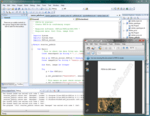Official Supplier
As official and authorized distributors, we supply you with legitimate licenses directly from 200+ software publishers.
See all our Brands.
Release Notes: rejected Better color handling for JPEG images with Exif data More workarounds for damaged PDF and font input files Improved treatment of Unicode CMaps for better handling of OpenType Features in Japanese ... to control aspects of the user interface Improved PDF form-field-to-Block conversion Several minor bug fixes ...
Release Notes: of unsupported input data, e.g. OpenType font variations. Improved handling of damaged and non-standard JPEG flavors as well as invalid XMP. Improved performance of SVG processing. Updated language bindings ...
Release Notes: 2.4. OpenType fonts with CFF tables trigger an SID-to-CID conversion when loaded with option "vertical=true". In this situation invalid Notice, Copyright and Weight strings were generated ...
Release Notes: for additional CSS properties in SVG. Updated language bindings incl. support for Perl 5.24 and Ruby 2.3. Reduced code and data size of the PDFlib Mini Edition (ME) for embedded systems. Hardened the code against ... malformed fonts and XML data. Bug fixes and minor improvements in the Table and Textflow formatters as well other areas. ...

Screenshots: application-specific data or alternate text without Tagging. ...

Screenshots: graphical content (Reference XObjects) for variable data printing. Reusable path objects and clipping paths imported from images. ...
Features: graphics, images, and hypertext elements in PDF A PDFlib program can be used for dynamically generating PDF – reflecting user input or dynamic data retrieved from web or database servers. The optional add-on ... of PDF files becomes possible With the programmer only being responsible for producing the data from whatever source, PDFlib takes the task of generating the PDF code which visually represents the data ... PDFlib can generate PDF data directly in memory (instead of on file), resulting in better performance and avoiding the need for temporary files, thus being the fastest PDF-generating method ...